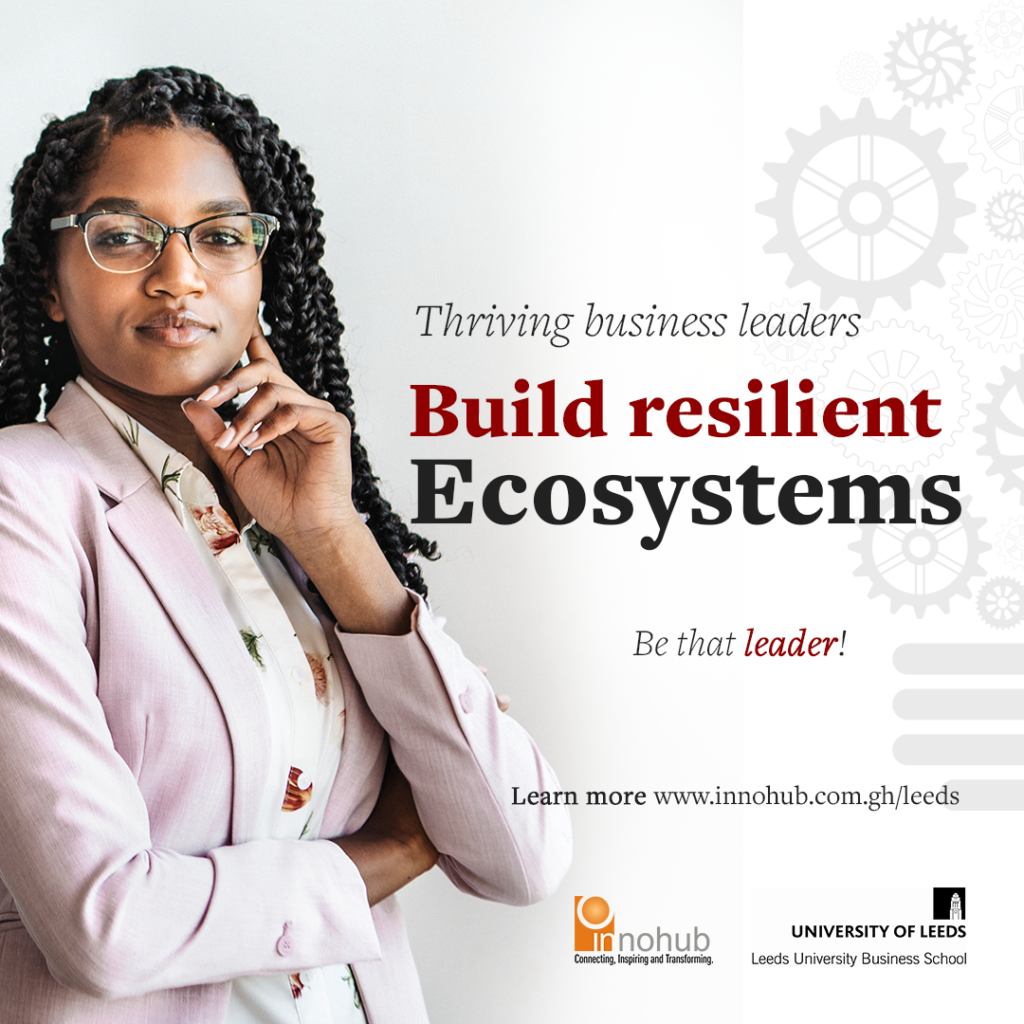
Executive Programme:
Entrepreneurial Ecosystem Leadership
Promoting Entrepreneurship
through Sustainable Ecosystems
Programme dates:
18th – 22nd September 2023
Time Commitment: Short Programme
Location: Leeds University, UK.
Cost: £4,500.


About the Programme
In the current VUCA world, emerging and developing economies are faced with the wicked problems of high and growing unemployment with its related developmental and security implications, low survival rates of startups and SMEs, high dependence on imports, and many challenges.
Entrepreneurship can be the key to unlocking resilient growth across Africa, but only when driven by both socially productive and growth-oriented new businesses. It is an enabler for socio-economic growth and development in Africa, especially within the context of youth unemployment and increasing youth population for which the traditional, and indeed emerging, industrial sectors will not be able to produce sufficient jobs to meet demand.
The trends of entrepreneurship reveal mostly necessity-driven and low-scale enterprising initiatives, with not many cases to show for highly transformational, high growth, high impact ventures that could create the needed jobs and shared prosperity. There is a need to develop a supportive ecosystem that fosters entrepreneurial success and growth.
This program has been designed to help entrepreneurial ecosystem builders in Africa and other emerging and developing economies to better appreciate the critical pillars required for building robust and resilient ecosystems and prepare participants for the task of innovation ecosystem development.
The session will be very practical and highly interactive, drawing deeply on various ecosystems around the world. If you are supporting entrepreneurship development in any capacity, this will be an unforgettable one week of your career.
The program is delivered by the University of Leeds, through the Leeds Business School, with Innohub as the Marketing and Coordinating Partner.

Structure of the one week in-person session
Programme Outline
From necessity to transformational entrepreneurship
Necessity entrepreneurship is driven by the need to generate income to support basic subsistence. This form of entrepreneurship is often seen in low-income or disadvantaged communities where individuals struggle to find traditional forms of employment. It is motivated by survival, and necessity entrepreneurs often significant lack business acumen and resources.
High levels of entrepreneurship alone are therefore not always an indicator of local economic success. Attendees will explore the conditions to encourage transformational entrepreneurial activity. Transformational enterprises are often characterised by innovation and a vision to scale and are typically driven by a desire to create significant change and positive impact. It is imperative that support organisations foster a transformational mindset and skillset.
Understanding/Analyzing Entrepreneurship Ecosystems- ecosystems mapping
Understanding entrepreneurial ecosystems provides an overview of the various elements that make up a supportive environment for entrepreneurs and small business owners.
These are localised and mean that support efforts may be targeted in different areas for each regional and national context. Attendees will learn about the key players within the ecosystem including investors, policymakers, education providers and support organisations and how they combine to help entrepreneurs succeed. It is important to identify and map the local ecosystem to establish areas for particular emphasis and investment when developing entrepreneurial capacity.
Developing your theory of change – linked to the SDGs
A theory of change is a framework used by NGOs, charities and support organisation to describe the process by which they expect to achieve their goals and objectives. It is a logical sequence of events that describes how an organization’s activities will lead to desired outcomes, and ultimately, to the overall impact it hopes to achieve. A theory of change typically includes the following components:
- Vision: A clear statement of the overall impact the organization hopes to achieve.
- Goals: Specific, measurable, and time-bound objectives that the organization aims to achieve in order to realize its vision.
- Activities: The specific actions and programs that the organization undertakes to achieve its goals.
- Outputs: The immediate results or products of the organization’s activities, such as the number of people reached by a program or the number of services provided.
- Outcomes: The intermediate changes or impacts resulting from the organization’s activities, such as improved health, increased knowledge, or increased income.
- Impact: The long-term changes or benefits resulting from the organization’s activities.
The theory of change is a powerful tool for NGOs and charities because it helps them to define their goals and objectives, measure progress, and make adjustments as needed to achieve their desired impact. It also helps the organization to communicate its work and objectives to stakeholders and funders.
Impact measurement
The evaluation of impact is an essential part of the demonstration of value resulting from a programme or initiative. It is the process of establishing the effectiveness of activities and in tracking the achievement of organisational goals. Impact measurement is essential means of illustrating the benefits of a programme to funders and in underpinning strategies for change and improvement. There are several key elements to successful impact measurement which operate in an ongoing and circular process:
- Defining goals and objectives
- Identifying indicators
- Collecting data
- Analysis and learning
- Communicating results
- Process improvement
Program Design considerations – with case studies
After mapping the local entrepreneurial ecosystem, developing a theory of change and exploring the process of impact measurement and evaluation the attendees will structure their programme of activities and support initiatives which are localised and specific to their own context. Case studies from around the world will also be introduced to support this design work.
Building Program Partnerships
As each organisation’s programmes are developed and refined it is important to establish what is currently on offer and to map any overlapping areas locally or gaps in provision. Partnership work is a valuable means to deliver a strong support package for entrepreneurs and small business owners, but this needs to be coordinated and responsive to the local ecosystem.
Localizing Support Programs
A strategy for local support will finalise the attendees’ plans resulting in a personalised set of goals and priority areas for your organisation achieved through a situational analysis of the organisation’s internal and external environment. This will take the form of:
- External Analysis – including industry, market, competitors, economic, social and political factors
- Internal Analysis – focus on organisational resources, capabilities, culture and structure
- Issue identification – establishing what the key issued and barriers are that face the organisation
- Gap analysis – comparison of the current and desired state of the organisation in relation to its Theory of Change and delivery expectations.
- Stakeholder analysis – analysis of the organisation’s relationships with customers, employees, shareholders, suppliers, beneficiaries and wider community
Funder perspectives
The final day will explore the identification of potential funders, developing effective grant proposals and partnerships and the challenges of aligning programmes and initiatives with funding and donor expectations.
There will also be guided tours of incubation and business support facilities in Leeds on this final day.

Why you should participate
The program presents unmatched benefits to you and your organization in your quest to support entrepreneurial ecosystems. These include:
- Network with other ecosystem players with aligned interests
- Acquire a deep appreciation of the multifaceted approach required to build an entrepreneurial ecosystem
- Exposure to various trends across select entrepreneurial ecosystems
- You will be equipped with tools and methodologies to analyse your entrepreneurial ecosystem
- You will better appreciate the connectedness of the various pillars of an entrepreneurial ecosystem
- Receive post program support in your ecosystem building efforts.
About
This programme is delivered by academic experts from the Leeds University Business School, a triple accredited full-service business school based in the United Kingdom. A part of the prestigious Russell Group of Universities, the University of Leeds has extensive experience in supporting and driving local entrepreneurship through various initiatives including NEXUS and the Centre for Enterprise and Entrepreneurial Studies at the business school.
Read more about the Leeds University
Business School here.
Fees:
The programme fee includes all tuition and education materials. Your registration is only confirmed upon full payment of program fees.
Discounts:
We offer a 10% discount to any
organization presenting up to 4.
Visa Requirements:
Upon full payment of the program fees and confirmation of participation, we recommend you immediately initiate the visa application process as it could take quite a number of weeks. We would provide you with any required visa application letter to support your visa application process.
Accommodation:
The program fees do not cover accommodation. We are happy to recommend a wide range of options for your consideration.
Contact:
1. Nelson Amo
Program Coordinating Lead
E-mail: nelson.amo@innohub.com.gh
Phone: +233 20 240 7144
2. Abigail Hunt
Leeds University Business School Programme Manager
E-mail: A.hunt@leeds.ac.uk
